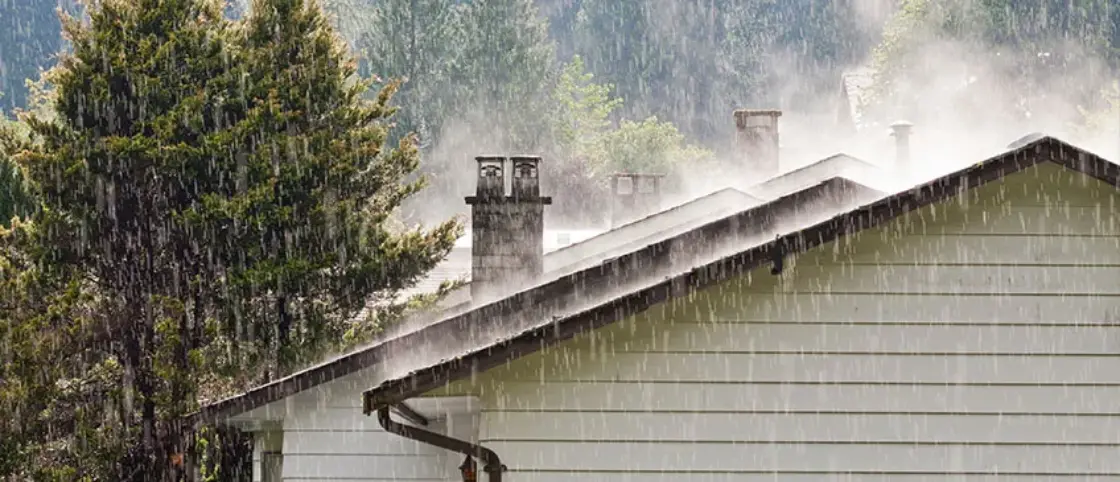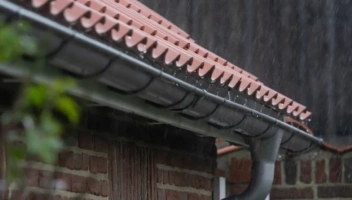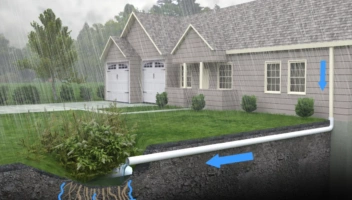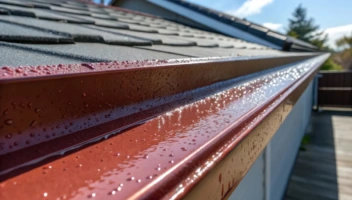Do Gutter Guards Work in Heavy Rain?

You want to protect your home and maintain your gutter system, but you aren’t sure of the best way to accomplish that. We get it! There’s conflicting information out there, and it can be difficult to know what’s best.
Gutter guards have become popular because they keep debris out of your gutters, protecting your home from roof, fascia, and foundation damage that can result from clogged gutters. However, one question remains: Do gutter guards work in heavy rain, or are there limitations?
Micromesh gutter guards do, in fact, work in heavy rain. However, in this post, we’ll review the different types of gutter guards in general and discuss why overflows during heavy rain can be a concern.
In this article:
Why Do My Gutters Overflow in Heavy Rain?
There are several reasons why gutters can overflow during heavy rain. Some issues, like clogging, can be easily remedied through regular maintenance. However, other common problems make it more difficult to tackle.
- Damage: Gutter systems don’t last forever. Whether a gutter is old or has withstood damage from the elements, that damage can cause the system to fail.
- Debris: Clogged gutters cannot allow water to flow efficiently, causing overflow. That’s why it is vital to keep them clean.
- Improper gutter guard installation: You must maintain the correct slope with the roofline when installing gutters. Otherwise water pools too easily.
- Incorrect gutter size: Gutters must fit the home and environment they’re installed in. If the gutters are too small for the roof size or the local rainfall, they’re bound to overflow.
- Inadequate gutter guards: If you’re employing gutter guards to protect your system from blockages but it’s still overflowing, you may need better guards. Low-quality gutter guards break down quickly and don’t protect gutters from clogs.
Can Gutter Guards Handle Heavy Rain?
Some gutter guards handle downpours better than others. They prevent blockages from building up in the gutter, but they are not all created equal. Different types of gutter guards are best suited for certain scenarios and climates – so they may not hold up against heavy rain.
- Aluminum gutter guards: These are stronger than the plastic versions. These guards prevent clogs, can last up to 20 years, and are sturdy against heavy rain.
- Brush gutter guards: One of the cheapest gutter guard solutions, brush-style gutter guards cannot handle heavy rain. They are only effective at preventing some gutter clogging.
- Foam gutter guards: These foam inserts are more of a short-term, stop-gap solution. Foam gutter guards won’t hold up against heavy rain and only last a few years.
- Micromesh gutter guards: These high-quality gutter guards help prevent even small debris like pollen, pine needles, and shingle grit from the gutters and are highly effective against a lot of water without overflowing.
- Reverse-curve gutter guards: Sometimes referred to as gutter covers, these are not as effective at preventing small debris clogs and must be replaced more often than other guards. However, they can be made of plastic or aluminum and hold up against heavy rain.
Gutter guards that aren’t as durable in heavy rain can cause gutter clogs, leading to overflow. When overflows happen, they may damage your roof and siding, and cause other issues. That’s why it is vital to know what kind of rain defense you need before installing gutter guards to ensure your peace of mind.
The Consequences of Overflowing Gutters
While you might think water flowing over the edges of the gutters is just an inconvenience, it can potentially cause significant water damage to your home. Overflowing gutters can lead to serious damage to your home, such as:
- Foundation Damage: If water is pooling around the home’s foundation rather than being diverted away by the downspouts, it can penetrate the foundation over time. This can lead to cracks, leaks, and, in severe cases, structural damage.
- Basement Damage: Your basement can also flood from the pooling water. This can damage personal belongings and lead to mold growth.
- Damage to Siding: Siding and exterior damage is also a possible result of clogged gutters, leading to warping and the need for repairs.
- Landscape Erosion: Landscape erosion is another possible issue. Mild cases might only affect the appearance of landscaping, but if it keeps happening, plants can be damaged. In addition, it can cause slippery spots by creating mud in warmer weather or freezing in cold weather.
- Roof Damage: If water is cascading over the edge of the gutters rather than diverting away from your home, it can also seep under your roof’s shingles and underlayment. This can lead to mold and mildew as well as leaks and other deterioration.
Pros and Cons of Gutter Guards in Heavy Rain
While gutter guards cannot guarantee gutters won’t overflow, they are one of the best ways to prevent it. Depending on which kind of guard you choose, you could see better results than with others. Even so, there are pros and cons to installing them that you should consider.
Pros:
- Effective against pests, especially those who nest in gutters
- Less gutter maintenance and cleaning
- Protects the gutter system against debris buildup and improves water flow
- Prevents water damage to roof, house, and gutter system
Cons:
- Guards can become clogged from debris accumulation brought by heavy downpours
- Weight of the rain can push guards out of place
Micromesh Guards Are The Best Heavy Rain Defense
The best way to combat these issues is to help prevent overflow as much as possible with a proven and tested solution to prevent clogged gutters like LeafFilter’s micromesh gutter guards.
To learn more about how LeafFilter gutter guards can protect your home, call us toll-free today at 1-833-984-4201.
Frequently Asked Questions
What is the best gutter guard for heavy rain?
Micromesh gutter guards, such as LeafFilter, are the most effective gutter guards for heavy rainfall. But you don’t have to take our word for it: Both Today’s Homeowner and EcoWatch have named LeafFilter as the best overall gutter guard for heavy rain, and our customers agree!
What are the disadvantages of gutter guards?
Gutter guards work very well, and are generally beneficial. But there are a few potential downsides: firstly, the installation costs are an investment, and some people simply might not have available funds to set aside for gutter protection. (As a side note, we offer financing for our gutter systems.) Not all gutter guards are completely maintenance-free; however, micromesh gutter guards allow for the most minimal amount of maintenance.
Is it better to have gutter guards or not?
It’s absolutely better to have gutter guards than to not have them. From clogged gutters to leaks and sagging, having unprotected gutters can lead to many problems. Gutter cleaning just isn’t enough, and that’s true even if you hire a pro. Our gutter guard system is designed to help keep your gutters clog-free and comes with a limited lifetime transferable warranty that can protect the value of your home.
How long should gutter guards last?
This really depends on the type of gutter guards you buy. That said, when it comes to the longevity of gutter guards, most mass-produced, DIY gutter guards are flimsy and have a shorter life span. Professionally installed gutter guards last much longer.


